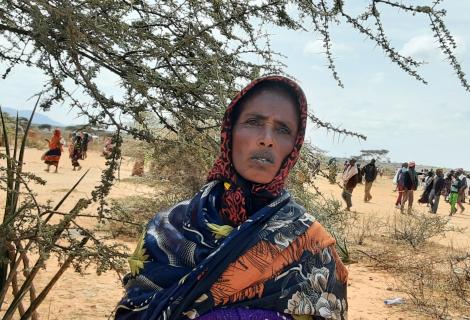
Recent assessment report by ActionAid Ethiopia and partners revealed that millions of people in Southeast are severely affected by an unprecedented draught caused by climate change particularly sharp shortfall of March-May rains. These communities, predominantly pastoralist, have lost their means of livelihood. They already have lost millions of their livestock in Borana zone of Oromia and Dawa zone of Somali regional states of Ethiopia where AAE and its partner made the assessment.
According to the report, only in Borena Zone about 1.5 million livestock has died, 17 thousand households have lost hundred percent of their livestock and they require urgent humanitarian assistance. To prevent large-scale displacement, adequate and timely response is required to support households facing challenges in terms of food security and livelihoods. The support is needed in a form of cash-based assistance or in-kind, i.e., food distributions. Livelihood support should also be prioritized to protect household assets including provision of livestock fodder and veterinary service, the report indicated.
|
During the first quarter of 2022, there has been an increase in the number of new severely acute malnutrition cases with more than 30,000 children being treated in health facilities compared to same period last year. |
The humanitarian situation continues to worsen in drought affected areas and across sectors of intervention. During the first quarter of 2022, there has been an increase in the number of new severely acute malnutrition cases with more than 30,000 children being treated in health facilities compared to same period last year, according to the report.
The terms of trade for livestock sales have reduced by 40 per cent due to low purchasing and poor livestock conditions severely impacting households’ income. Between October 2021 and mid-April 2022, more than 344,000 people have been displaced in search of water, pasture, and assistance, including 175,000 people in Somali Region and 139,000 people in southern Oromia Region. Community members mentioned that children’s education is increasingly affected with school dropout rate increasing due to families migrating to better-off areas and due to lack of water sources at schools. Local authorities stated that more than 2,000 schools are closed including 1,800 schools in Somali, 334 schools in East and West Hararge zones in Oromia regions alone, affecting more than 682,000 students. Worsened by the drought impact compounded with limited water, sanitation, and hygiene (WASH) interventions, there is a fear of water borne diseases like cholera in some of the drought affected areas.
Adi Meliti Dida Kusa, is 58 years old widow, raising eight children (five boys and three girls) by her own. She is displaced from Medhecha Kebele of Dire woreda of Borena Zone. One of her children is attending in Bule Hora University.
She lost all her 78 cattle and 60 goats and sheep despite trying her level best to save the lives of the cattle by selling 30 goats/sheep and purchasing fodder.